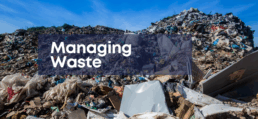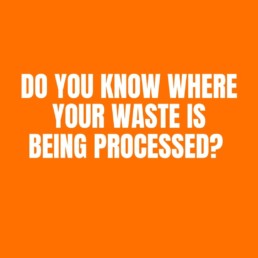Environment agency confirms new charging approach for simpler recycling
The Environment Agency (EA) has confirmed changes to how it will recover the costs of regulatory work linked to the simpler recycling reforms, following a public consultation.
Under the new approach, the EA will apply a £118 hourly “time and materials” charge where regulatory work is required due to non‑compliance. The charge applies only to businesses and occupiers of relevant non‑domestic premises that fail to meet the recycling requirements.
Why the change?
The updated charging model is designed to ensure that the cost of enforcement falls on non‑compliant businesses, rather than those that meet their obligations. This reflects the polluter pays principle and aligns with how the EA recovers costs for other technical regulatory services.
The hourly rate is based on an assessment of the staff time and activities needed to carry out compliance checks and enforcement work.
Consultation outcome
Feedback on the proposals was mostly positive, with respondents commenting on fairness, customer impact, environmental protection, and the design of the charging scheme. After reviewing all responses, the EA decided to implement the charge as proposed, without changes.
When it takes effect
The revised charges will apply from 3 February 2026. The updated charging scheme has now been published on GOV.UK.
What this means for businesses
- Compliant businesses will not be charged
- Non‑compliance may result in hourly regulatory charges
- Early compliance helps avoid additional costs and regulatory intervention
For businesses, the message is clear: meeting simpler recycling requirements reduces both regulatory risk and cost.
The EA have published and updated their documents regarding charges (these charges started from 3/2/2026) Read the full details here:
Unlocking the insights of waste management
Managing waste responsibly is more than just a regulatory requirement, it’s a smart business move.
Every business generates a variety of waste types, from paper and plastics to electronics and food scraps. But do you know where your waste goes after it leaves your premises? Here we provide an overview of the main categories of waste commonly found in businesses, how each is collected, and what happens during the recycling process. Some processes may vary pending on types of waste, the supplier used.
Our goal is to help you identify your waste streams and make informed decisions that benefit both your business and the environment.
Paper and cardboard
- Collection: Separate bins for office paper, packaging, newspapers, and shredded documents. We can also arrange special waste collections for confidential waste.
- Recycling Process: Sorted to remove contaminants, shredded and mixed with water to create pulp, cleaned, refined, and pressed into new paper or cardboard products. Cardboard is often baled for efficient storage and transportation.
Plastics
- Collection: designated bins for different plastic types (e.g., PET, HDPE).
- Recycling Process: Plastics are sorted by type, cleaned, shredded, melted, and remolded into pellets for manufacturing new products. Some plastics require specialised recycling due to chemical composition.
Paper, cardboard, and plastics can also be collected together as part of our dry mixed recycling (DMR), where they are subsequently sorted and separated on-site. Download our DMR poster here.
Glass
- Collection: Separate containers for glass bottles, jars, and other glass items.
- Recycling Process: Glass is cleaned, sorted by color, crushed, and melted to form new glass products. Contaminants like ceramics or metals are removed during sorting.
Metals
- Collection: Bins for aluminum cans, steel, copper, and other scrap metals.
- Recycling Process: Metals are sorted, cleaned, melted, and reformed into new metal products. Aluminum and steel are among the most efficiently recycled materials.
Food and Organic Waste
- Collection: Separate bins for food scraps, coffee grounds, and biodegradable packaging. Download our Food Waste Poster.
- Recycling Process: Sent to composting facilities or anaerobic digestion plants to produce compost or biogas. This reduces landfill use and generates renewable energy.
Electronic Waste
- Collection: Special containers for computers, printers, mobile phones, and other electronics.
- Recycling Process: Electronic waste is dismantled, hazardous components are safely removed, and valuable metals and plastics are recovered for reuse.
Hazardous Waste
- Collection: Secure containers for chemicals, batteries (including e-cigarettes - vapes), fluorescent bulbs, and medical waste.
- Recycling/Disposal: Requires specialised handling and treatment to neutralise toxins, often through incineration, biological treatment to break it down, chemical treatment to make it non-hazardous, or specialised, secure landfill.
Construction and Demolition Waste
- Collection: Skips or bins for concrete, bricks, wood, glass, and metals.
- Recycling Process: Materials are sorted, cleaned, and reused in new construction projects or recycled into raw materials.
Implementation
- Waste Audits: Regularly analyse waste streams to identify reduction opportunities.
- Employee Training: Educate staff on proper sorting and recycling procedures.
- Technology Integration: Use smart bins and tracking software to optimise collection and recycling.
- Circular Economy: Design products for durability, repairability, and recyclability; implement take-back programmes.
- Compliance: Ensure full adherence to all regulations governing waste disposal and recycling. This is especially crucial following the introduction of Simpler Recycling.
Implementing these practices is not just about environmental stewardship it’s a strategic business decision that delivers financial, operational, reputational, and social benefits.
If you’d like more details or want a free audit of your business get in touch.
Christmas and New Year opening 2024
Is your business on target to reach net zero by 2050?
Helping you navigate and fund net zero
As the government focuses on reducing carbon emissions and greenhouse gases by 2050, there's been increasing talk about net zero, especially among smaller businesses.
Research shows that smaller businesses are a significant source of emissions in the UK, responsible for 50% of all business-driven emissions. While 57% of smaller businesses know the government's 2050 net zero target, 76% have yet to implement a strategy to reduce their emissions.
All businesses, regardless of size, have the opportunity to make a significant impact on sustainability and lower carbon emissions. By taking proactive steps, they can contribute to a reduction of carbon emissions.
Operations
Enhancing premises with proper insulation, actively encouraging employees to embrace alternative transportation, fostering a culture of engagement, cutting down on waste, and minimising energy consumption are all vital steps toward a more sustainable and efficient workplace.
Products and services
Embracing sustainable practices by selecting products crafted from eco-friendly materials, adopting effective waste management strategies, and collaborating with trusted suppliers who prioritise sustainability.
Distribution
Choosing packaging created from recycled materials, adopting electric vehicles for transportation, and streamlining deliveries to reduce their frequency can significantly lower the environmental impact and promote a more sustainable future.
Embracing Net Zero
By committing to net zero, businesses stand to gain significantly from enhancing their reputation and reducing operational costs, safeguarding themselves against the volatility of energy supply fluctuations. Embracing this sustainable approach supports the environment and strengthens market position.
Footprint Recycling is here to assist you if you need help beginning your sustainability journey. We specialise in establishing a net zero baseline and crafting effective reduction strategies. Creating a robust net zero strategy requires thoroughly evaluating Scope 1, 2, and 3 emissions. Firstly, we need to assess your emissions:
Scope 1 Emissions
These are "direct emissions" that an organisation directly owns or controls. Examples include emissions from gas boilers, fuel generators, and company-owned vehicles that are not electrically powered.
Scope 2 Emissions
These emissions are classified as "indirect emissions" and arise from the consumption of purchased electricity, steam, heat, and cooling.
Scope 3 Emissions
This category includes all "other indirect emissions" not accounted for in Scope 2. These emissions are generated throughout the value or supply chain, encompassing upstream (customer-related) and downstream (supplier-related) emissions.
After we assess your current emissions, we will create a plan to reach net zero emissions within an agreed-upon time frame. We will also assist in sourcing any relevant grant schemes available to support businesses financially in achieving net zero. We will compare your emissions each year to show your progress in reducing them.
Benefits to your business
Reduced costs
Transform your business by significantly lowering utility bills through renewable energy sources. Investing in solar panels or transitioning to a green energy plan cuts costs and enhances your brand's commitment to sustainability. By carefully analysing energy usage, you can uncover additional savings opportunities. Moreover, switching to electric vehicles is a smart choice for businesses operating in low-emission zones of major cities, yielding both financial and environmental benefits. Adopting waste reduction practices, recycling efficiently, and striving for zero waste in landfills will minimise expenses and position your business as a leader in responsible practices. Embrace these changes for a more sustainable and cost-effective future!
Business Reputation
Embracing carbon-neutral practices can significantly elevate your business's reputation. According to research by the Carbon Trust customers increasingly seek companies that prioritise ethical decision-making. By engaging in carbon offsetting, sourcing materials locally, reducing transportation emissions, and minimising landfill waste, small businesses can contribute to a healthier planet and attract a loyal customer base that values sustainability.
Attracting investment
Investors and shareholders looking for companies with a sustainable long-term strategy may find a net zero business attractive.
Security and resilience
Pursuing net zero is not just an environmental goal; it's a smart strategy for strengthening your business against market fluctuations and national disruptions. For instance, adopting electric vehicles can help companies to avoid rising fuel costs. Likewise, switching to alternative energy sources like solar or wind can protect you from unpredictable spikes in energy costs, ensuring your business remains stable and competitive.
Competitive edge
Recognising and reducing your carbon footprint can set your business apart. As customer preferences shift, many consumers now prioritise business sustainability, scrutinising everything from product packaging to reduction in carbon emissions. Embracing eco-friendly practices attracts these conscientious shoppers and elevates your brand's reputation.
If you want to chat or need help achieving your net zero goals, get in touch.
RESOURCES
Funding and grants for carbon net zero
Finding funding for carbon net zero projects can be challenging. However, there are various pots of funding and support available throughout the country. Many local councils offer some kind of net zero grant programmes, so it's worth checking in your local area. It's also worth checking Crown Commercial Gov - grants and funding opportunities from across the government.
Funding opportunities can also be found through government funding programmes.
Net Zero Strategy: Build Back Greener
This strategy sets out policies and proposals for decarbonising all sectors of the UK economy to meet our net zero target by 2050.
Parliament Research Briefing
The UK is committed to reaching net zero by 2050. This briefing provides an overview of the background context for net zero, the plans in place to reach this goal, and current progress.
Deloitee - The Sustainable Consumer 2023
Adoption of more sustainable lifestyles continues to grow, but sustainable choices need to be made more affordable and widely accessible for consumers to contribute to the net zero transition.
Responding to the needs of our customers
We recently had a conversation with one of our customers and gained valuable insights about the benefits of working with Footprint Recycling. It was such an inspiring story we shared it across our channels and we received a comment about the importance of reviewing where the waste was being processed and ensuring it was being processed effectively. This is absolutely right.
All businesses need to consider where their waste is processed as part of their waste journey as when it comes to reducing waste and promoting sustainability, businesses have a significant role to play.
At Footprint, we believe that a comprehensive waste journey analysis is the first step towards achieving this goal. We work closely with our customers to assess their waste production and identify areas where they can reduce, recycle, reuse, and repurpose waste.
We then assist them in implementing these changes while ensuring that they comply with all legal requirements. We understand that monitoring and reporting are critical components of any waste management process. That's why we provide our customers with regular updates on their waste journey process, including data on waste generation, recycling rates, disposal methods and outcomes. This information helps them to evaluate their progress and identify areas for further improvement.
We believe that a zero-waste approach is the way forward, and we encourage our customers to adopt this mindset. By eliminating waste from their production processes and finding innovative ways to repurpose and reuse materials, businesses can significantly reduce their environmental impact while saving money.
In conclusion, our comprehensive waste reduction process is designed to guide businesses towards sustainability and zero-waste practices. We believe that by working together, we can make a real difference and build a better future for generations to come.
New Service Offer 2022 – Start your journey to net-zero emissions
Start your journey to net-zero emissions
2022, and we are all under pressure to reduce our carbon emissions. While it’s been at the forefront of our minds over the years, it is now reaching an emergency state with worldwide leaders and climate change organisations working together and applying pressure to governments, countries, and companies to act. But where do you start?
Over the past 15 years, we’ve been on a journey to help businesses dispose of, reduce, and recycle their waste and increase sustainability. As part of this journey, we are now offering a new service that provides a path to help you identify, plan and reduce your carbon emissions. Our process is simple:
- Consultation and planning – help you understand and plan
- Measure your carbon emissions – collect the data and identify
- Reduce your carbon emissions – ways to reduce your carbon emissions
- Compensate your carbon emissions – offset your business footprint.
Helping you calculate your climate footprint including scope 3 supply chain emissions
Carbon emissions are identified under three scopes, it’s a way to categorise the different kinds of carbon emissions you create. An estimation of your carbon emissions under each scope will result in a “carbon footprint”. Therefore, a phased approach to identifying the company’s carbon emissions under each scope is recommended, with a short-term carbon-neutral goal, and a longer-term net zero carbon goal (based on delivery of a carbon reduction plan).
Establishing a baseline for your Scope 1 and 2 carbon emissions will enable the business to understand the carbon impact associated with its energy use.
Scope 1 covers the Green House Gas emissions that a company directly makes — for example, running its boilers and vehicles.
Scope 2 are the emissions it makes indirectly – like when the electricity or energy it buys for heating and cooling buildings is being produced on its behalf.
Scope 3 is a little more complicated as it covers all the emissions associated with your business, even those you are indirectly responsible for. For example, buying from suppliers and its products when customers use them.
We work with a range of carbon standards, including the Greenhouse Gas Protocol; PAS 2060 for carbon-neutral organisations; PAS 2050 for carbon neutral products; Streamlined Energy and Carbon Reporting; ISO 14064-1 for greenhouse gas inventories; ISO 14064-3 for verification of greenhouse gases; and a range of sector-specific guidelines as appropriate. Your carbon ambitions (e.g. carbon neutrality), and what is important to your stakeholders will determine which Standard is most appropriate to work with for you.
If you’d like to start your carbon-neutral journey get in touch clare@footprint-recycling.com






